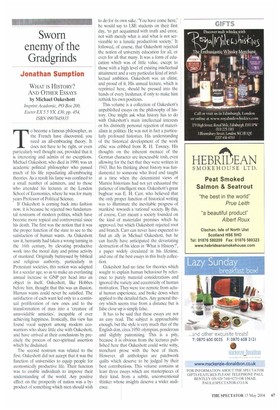Sworn enemy of the Gradgrinds
Jonathan Sumption
WHAT IS HISTORY? AND OTHER ESSAYS by Michael Oakeshott Imprint Academic, PO Box 200, Exeter EX 5 5 YX, £30, pia 454, ISBN 0907845835 To become a famous philosopher, as the French have discovered, you need an all-embracing theory. It does not have to be right, or even particularly well thought out, provided that it is interesting and admits of no exceptions. Michael Oakeshott, who died in 1990, was an academic political philosopher who passed much of his life repudiating all-embracing theories. As a result his fame was confined to a small number of admirers, and to those who attended his lectures at the London School of Economics, where he was for many years Professor of Political Science.
If Oakeshott is coming back into fashion now, it is because he rejected two fundamental nostrums of modern politics, which have become more topical and controversial since his death. The first was the notion that it was the proper function of the state to see to the satisfaction of human wants. As Oakeshott saw it, humanity had taken a wrong turning in the 16th century, by elevating productive work into the moral duty and prime activity of mankind. Originally buttressed by biblical and religious authority, particularly in Protestant societies, this notion was adapted for a secular age, so as to make an everlasting annual increase in GNP per head into an object in itself. Oakeshott, like Hobbes before him, thought that this was an illusion. Human wants could never be satisfied. The satisfaction of each want led only to a continual proliferation of new ones and to the transformation of man into a 'creature of unavoidable anxieties', incapable of ever achieving happiness. Ironically, this view has found vocal support among modern ecowarriors who share little else with Oakeshott, and have arrived at their conclusions by precisely the process of neo-spiritual assertion which he disdained.
The second nostrum was related to the first. Oakeshott did not accept that it was the function of universities to equip people for economically productive life. Their function was to enable individuals to improve their understanding of the world. Any positive effect on the prosperity of nation was a byproduct of something which men should wish to do for its own sake. 'You have come here,' he would say to LSE students on their first day, 'to get acquainted with truth and error, not with merely what is and what is not serviceable to a lunatic productivist society.' It followed, of course, that Oakeshott rejected the notion of university education for all, or even for all that many. It was a form of education which was of little value, except to those with a high level of existing intellectual attainment and a very particular kind of intellectual ambition. Oakeshott was an elitist, and proud of it. His annual lecture, which is reprinted here, should be pressed into the hands of every freshman, if only to make him rethink his own positions.
This volume is a collection of Oakeshott's unpublished essays on the philosophy of history. One might ask what history has to do with Oakeshott's main intellectual interests or his distinctly personal rejection of materialism in politics. He was not in fact a particularly profound historian. His understanding of the historical development of the work ethic was cribbed from R. H. Tawney. His thoughts on the inherent menace of the German character are inexcusable tosh, even allowing for the fact that they were written in 1943. But his thinking about history was fundamental to someone who lived and taught at a time when the determinist views of Marxist historians had not yet exhausted the patience of intelligent men. Oakeshott's great bugbear was E. H. Carr, who believed that the only proper function of historical writing was to illuminate the inevitable progress of mankind towards a 'rational' society. By this, of course, Carr meant a society founded on the kind of materialist premises which he approved, but which Oakeshott rejected root and branch. Carr can never have expected to find an ally in Michael Oakeshott, but he can hardly have anticipated the devastating destruction of his ideas in 'What is History?', a paper widely circulated in his lifetime, and one of the best essays in this lively collection.
Oakeshott had no time for theories which sought to explain human behaviour by reference to purely material considerations and ignored the variety and eccentricity of human motivation. They were too remote from actual human experience, and broke down when applied to the detailed facts. Any general theory which seems true from a distance but is false close up is simply false.
It has to be said that these essays are not an easy read, The subject is approachable enough, but the style is very much that of the English don, circa 1950: olympian, ponderous and slightly patronising. This is a pity, because it is obvious from the lectures published here that Oakeshott could write witty, trenchant prose with the best of them.
However, all anthologies are patchwork quilts which deserve to be judged by their best contributions. This volume contains at least three essays which are masterpieces of their kind, from a subtle, unconventional thinker whose insights deserve a wider audience.


































































































 Previous page
Previous page